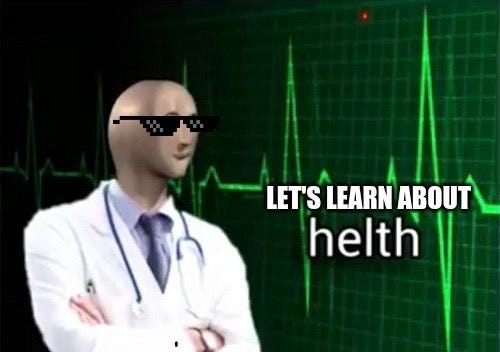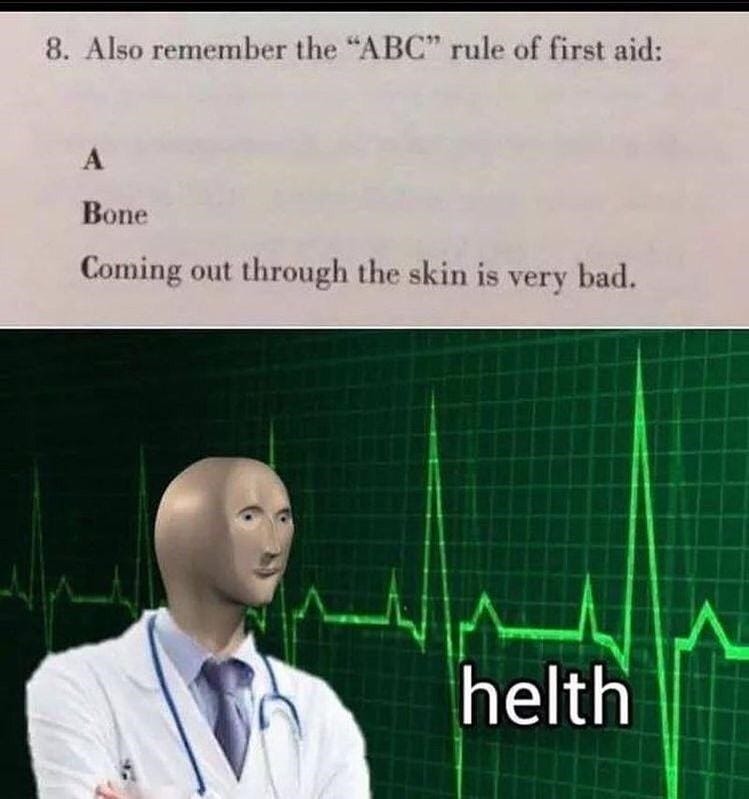This is the first installment of a series of posts dealing with the political and social economy of food and health. Hang onto your hats, cause I have big thoughts and feelings on this topic and I’m gonna be saying some sh*t.
Social media. Even for well-initiated Gen Zs and millennials, it’s truly the Wild Wild West- a virtual hurricane of information, misinformation, what your friend’s mom ate for lunch, suspiciously pointed targeted ads, and posts that leave you wondering if being a cat influencer is an actual job and how you can become one. And it’s a gold mine for my favorite internet gimmick, the meme (please enjoy the above “helth” meme, I know I am).
It’s also- surprise!- an endless black hole of diet and wellness bullshit. On my inaugural scroll of TikTok (which I downloaded in an attempt to be hip and cool and to keep up with the Youths), I found that every third video- not an exaggeration- that was shown to me by the algorithm was diet and wellness culture-related. It was either “before and after” fitness/weight loss progress photos, a low-carb recipe, or some kind of wellness product promising to help me shed pounds or get glowing skin. Having been an Instagram user for years I have spent time and energy deliberately culling diet culture content from my feed, but without such intentional and careful curation it appeared to me automatically, seemingly by default. Alarmed, but sadly not surprised, I quickly closed the app and haven’t really scrolled through since. One more elder millennial giving up on TikTok.
Recently I saw an Instagram post that ended with the old adage “you are what you eat”. It’s is a pretty weathered, run-of-the-mill turn of phrase that we’ve all heard 18,000 times. But while reading “you are what you eat” this time, I had what may seem like a strange reaction- it annoyed me to the point of righteous indignation, which dissolved into a mild but seething anger that prompted me to begin writing this post. You might think that as a chef whose stock and trade is food and feeding people, I’d ascribe to such a mentality. But I don’t.
Diet culture has effectively reduced the idea of health down to three factors- what we eat, how much we exercise, and the size and shape of our body as a direct result of these behaviors. But it is so much more than that.
Health is getting enough sleep, drinking enough water. It’s feeling connected to your community. It’s keeping your stress levels low, having emotional and financial stability, nurturing healthy relationships and a support system. It’s eating enough food to fuel your body and brain, food that you enjoy and help you feel connected to your cultural traditions. It’s having ample leisure time to rest and do things you love with the people you love. It’s complicated, multifaceted, and it looks different for different people at different stages of life. Health is a privilege, it’s subjective, and it is inherently fleeting.
As such, I think the reduction of *helth* to just diet and exercise is dangerously myopic, and in time starts to breed a troubling sort of cognitive dissonance. We begin to use “fitness” as code for thinness, “healthy eating” as code for low calorie, low carb, low sugar (read: low energy) foods implied to have the power to change our bodies if we eat enough of them. “Processed foods” are demonized, while various powders and protein bars and shakes (newsflash: also processed) are touted to help meet “fitness goals”. We begin to look at entire cuisines and cultural food staples- foods that have sustained huge groups of people for centuries- as “unhealthy”; we frown on the ubiquity of white rice in Mexican food, while praising the health and longevity of Japanese centenarians (for whom white rice is also a dietary staple). Foods are labeled healthy or unhealthy due the minutiae of their molecular composition- glycemic index, fiber to carb ratio, relative nutrient density- which causes us to lose sight of whether we even like them or not. Widespread acceptance of this sort of body-based computation- calories and nutrients in → physical results out- normalizes regarding the body as if it’s a machine, which it is not. Hyper-focus on biological processes and physical appearance as the ultimate measure of health is at best questionable and inaccurate, and at worst, dangerous.
How many of us have believed- consciously or not- that if we just lost those pesky ten or twenty pounds, if we started “eating right” and working out daily, our lives would be transformed and everything we want out of life would follow? Aubrey Gordon, author and co-host of my fave podcast Maintenance Phase, speaks eloquently on this very notion in one episode from November 2020. She talks about the subtle but insidious mindset being sold by the diet and wellness industries that “if you get your body right, your whole life will fall into place… what (diet and wellness brands) are selling here is… this very tempting magical thinking that if you can just address this one thing that is kind of like, mechanical, then you don’t have to do the messy work of fixing your relationships, you don’t have to worry about uncertainty or heartbreak or sickness or any of the things that make life uncomfortable.”
This is not to discount the very real phenomenon of weight stigma in our culture, and the real life experiences that reinforce the belief that thin and fit = healthy and happy. Simply existing in a larger body is incredibly difficult in today’s day and age as judgment and even outright discrimination abound. Myriad obstacles are built into every day activities for larger folks- fewer clothing options; public spaces such as airline seats, restaurant booths, public transportation and park benches; MRI machines; all these do not accommodate larger bodies by design. Studies have shown that folks in larger bodies get paid less than those in smaller bodies, a trend that is especially applicable to women, and may be more likely to be denied loans, mortgages, adoptions, life insurance, job positions and promotions. All sorts of assumptions about people in larger bodies exist somewhat subconsciously in the collective mind, not the least of which are things like “fat people are fat because they’re lazy” or “they eat too much” (implying a character judgment of lack of motivation or self-control), and “fat people are unhealthy”.
In reality, we know nothing about someone’s physical health just by looking at them; we can’t know their blood pressure, their cholesterol or magnesium levels, how frequently they exercise, their white blood cell count, whether they have any chronic conditions or disabilities. Indeed, comprehensive contemporary research has shown that the causative relationship between larger body size and health markers is actually quite flimsy. Factors like chronic stress from ongoing discrimination and weight stigma plus other social determinants like negative healthcare interactions and reduced access to equitable care might in fact be stronger drivers of health conditions associated with obesity than adiposity. Life-threatening eating disorders are a huge and ever-growing problem, with only 6% of sufferers medically diagnosed as “underweight”; folks in larger bodies are half as likely to receive an accurate diagnosis. Despite existing medical norms insisting that folks in larger bodies should be trying to lose weight at all times- implying that body size is always within one’s control, and that weight loss is beneficial no matter the cost- exhaustive research has proven that intentional and long-term sustained weight loss is not just a statistical anomaly, but functionally near impossible.
(If you’re interested in learning more about weight stigma and anti-fat bias, Aubrey Gordon’s book “What We Don’t Talk About When We Talk About Fat” is a great place to start. Some social media accounts are @heysharonmaxwell, @thefatdoctor and @theunplugcollective)
Byung-Chul Han’s modern philosophical work The Burnout Society (which, if you’ve interacted with me at all in the last few months, you know I have been droning on about at length) posits a radical theory about our pursuit of physical health: as society’s new moral imperative, as the new idol we worship. In a postmodern world that is less and less universally dictated by Judeo-Christian values, Han argues that capitalism has replaced God as the center of daily life; as such, today’s citizen is a self-exploiting “entrepreneur of the self”, constantly compelled to produce more, achieve more, improve, optimize, hack, streamline all facets of life- including our bodies.
Han writes, “the capitalist economy absolutizes survival. It is not concerned with the good life. … Given the atomization for survival and the erosion of the social, all that remains is the body of the ego, which must be kept healthy at all costs. …Health becomes self-referential and voids itself into purposiveness without purpose. …Life reduced to bare, vital functioning is life to be kept healthy unconditionally. Health is the new goddess.”
I don’t claim to have a master plan for loosening the hold that diet culture has on our concept of health- I live in this world too, and I struggle daily with body image, pressure to work out, and constant ambush by airbrushed models on social media just like everyone else. What I know for certain, however, is this: since I’ve started to examine and actively heal my relationship with food and exercise, I have so much more free mental space and energy for other things now that I’m less consumed by the need to control or change my body. It’s been hard work but very worth doing, and I recommend it. And although personal growth and healing in this arena is super important, no amount of self-love, self-acceptance or body positivity is going to change the paradigm we live in. We need a system reboot from the ground up, and we need to actively build a new and different anti-diet culture world for our kids- one where it’s safe and comfortable to inhabit a body of any size, and where all aspects of health are equally prioritized, encouraged and valued. We need to build a world where, as Han puts it, we are concerned with the good life. So let’s get to work :)
In the meantime, I’ll share with you a few things I like to keep in mind while navigating these waters:
Bodies change all the time for all kinds of reasons- aging, medication, disease, stress, genetics- and it’s not anyone’s business why. Body size and shape are subject to genetic biodiversity, just like height and hair color. Your body will change throughout your life because it’s what bodies do.
Weight loss is not always intentional or a positive change, and commenting or complimenting it is not always welcome or appropriate. Honestly, just don’t.
Orthorexia is very real, and it’s a set of behaviors that is widely considered acceptable and even aspirational, which makes it all the more dangerous.
All people deserve care and respect, whether you think they are “healthy” or not, and pursuit of health is optional. You never know what’s going on behind the scenes so don’t make assumptions.
Eat foods you love that are accessible to you. Get enough calories to fuel your brain and body. Get exercise in a way that you enjoy and do it because it feels good to move, not because it leads to weight loss. The rest will take care of itself.







